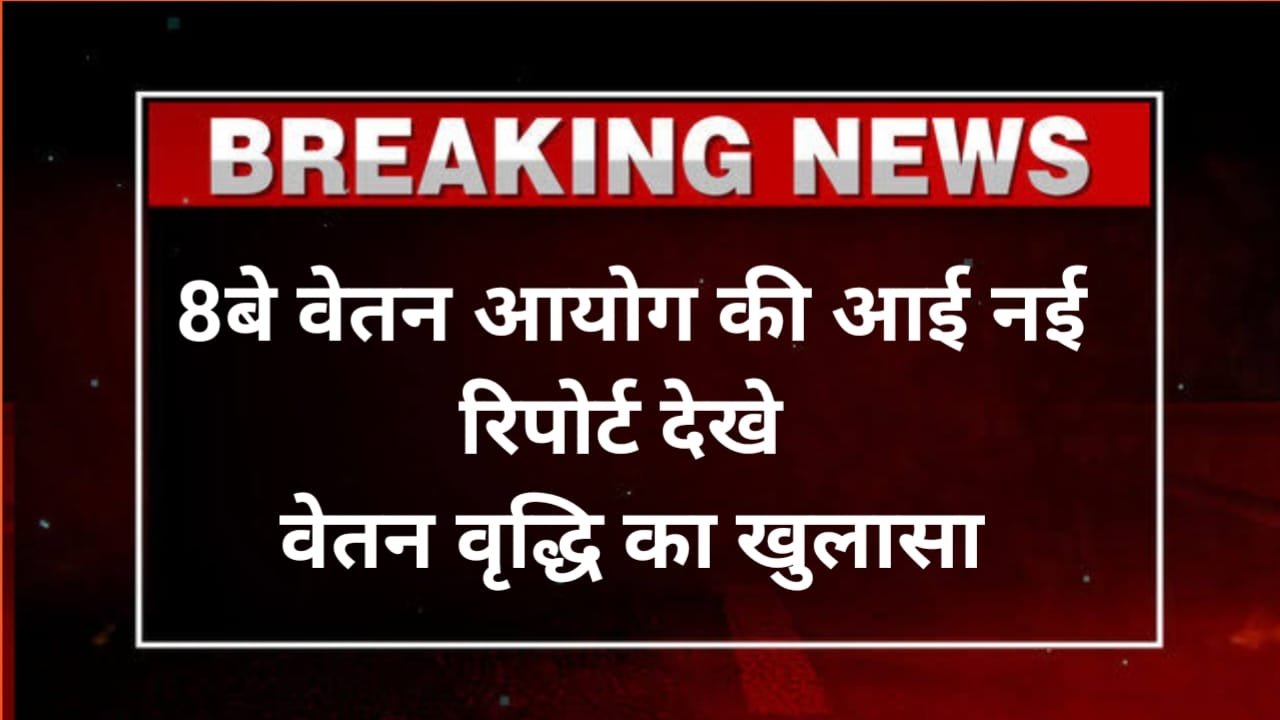Great news for central government employees and pensioners! The 8th Pay Commission, approved by the Union Cabinet on January 16, 2025, is set to bring major changes to salaries, pensions, and allowances starting January 1, 2026. This commission will benefit over 50 lakh employees and around 65 lakh pensioners with a projected salary and pension hike of 30-34%. With a fitment factor likely between 1.92 and 2.86, the minimum basic salary could jump from ₹18,000 to as high as ₹51,480. The government is still finalizing the commission’s members and terms, but excitement is building. Here’s everything you need to know about this game-changing update.

What is the 8th Pay Commission?
The 8th Pay Commission is a government panel that reviews and updates salaries, pensions, and benefits for central government employees every 10 years. It was officially announced by Union Minister Ashwini Vaishnaw to tackle rising living costs and ensure fair pay. The commission will look at economic conditions, inflation, and employee needs to suggest changes. It replaces the 7th Pay Commission, which started in 2016 and ends on December 31, 2025. X posts show employees are thrilled but want clear details on the fitment factor and timeline soon. Check dopt.gov.in for official updates.
Expected Salary and Pension Hike
The biggest highlight is the expected salary and pension increase. The fitment factor, a multiplier for calculating new pay, is likely to be between 1.92 and 2.86, compared to 2.57 in the 7th Pay Commission. Here’s what it means:
| Current Basic Pay/Pension | Fitment Factor | New Basic Pay/Pension |
|---|---|---|
| ₹18,000 (Level 1 Salary) | 2.86 | ₹51,480 |
| ₹9,000 (Minimum Pension) | 2.86 | ₹25,740 |
| ₹40,000 (Mid-Level Salary) | 2.5 | ₹1,00,000 |
Pensions could rise by up to 186%, with the minimum pension jumping from ₹9,000 to ₹25,740. Dearness Allowance (DA), expected to hit 70% by 2026, will merge with the basic pay. This could mean a Level 1 employee’s salary rises to ₹52,898 with a 1.92 fitment factor.
Key Changes and Benefits
The 8th Pay Commission will bring more than just salary hikes. It aims to make the pay structure fairer and simpler. Here’s what to expect:
- Revised Pay Matrix: A new pay matrix will replace the current one, making salary levels clearer for all job roles.
- Higher Allowances: Dearness Allowance (DA), House Rent Allowance (HRA), and Transport Allowance (TA) will be updated. HRA will vary by city (27% for metros, 20% for Tier-2, 10% for Tier-3).
- Unified Pension Scheme (UPS): Starting April 2025, UPS offers a fixed pension of 50% of the last 12 months’ salary for employees with 10+ years of service.
- Health Insurance: A new scheme may be introduced, similar to the 7th Pay Commission’s health benefits.
- Lower Pay Mergers: Levels 1–2, 3–4, and 5–6 may combine to reduce pay gaps and boost career growth.
These changes will help employees and pensioners cope with inflation and improve financial security.
How Will It Affect Employees and Pensioners?
The 8th Pay Commission will impact over 1 crore people, including 50 lakh employees (like railway workers, defense personnel, and clerks) and 65 lakh pensioners. For example, a Level 1 employee earning ₹18,000 could see their salary rise to ₹34,560–₹51,480, depending on the fitment factor. Pensioners with a current pension of ₹9,000 could get up to ₹25,740. The commission may also focus on lower-paid employees to ensure fair pay across levels. X users are excited, with some hoping for a fitment factor above 3.0, though 2.5–2.86 is more likely. The estimated cost to the government is ₹1.8–₹3.2 lakh crore, boosting sectors like automobiles due to increased spending.
When Will It Start and How to Prepare?
The 8th Pay Commission is expected to start on January 1, 2026, but the panel may take 18–20 months to finalize its report, so delays are possible. The government is yet to announce the chairperson and terms of reference (ToR), which could be set by April 2025. Employees can use the ClearTax 8th Pay Commission Salary Calculator on cleartax.in to estimate their new salary based on current pay, DA, and HRA. To stay updated:
- Check dopt.gov.in for official announcements.
- Follow @efile_tax or @bsindia on X for news, but verify with government sources.
- Use the salary calculator to plan finances.
- If you’re a pensioner, ensure your details are updated for the Unified Pension Scheme.
X posts suggest employee unions are pushing for interim relief until the commission is fully set up.
Why This Matters
The 8th Pay Commission is a big deal for government employees and pensioners. It will make salaries and pensions more competitive, helping people manage rising costs. The new pay matrix and allowances will improve work-life balance and job satisfaction. For pensioners, the Unified Pension Scheme and higher pensions mean better financial security after retirement. The commission’s changes could also boost the economy, as employees spend more on goods and services. With the government finalizing details, now is the time to stay informed and plan ahead. Visit dopt.gov.in for the latest updates and get ready for a brighter financial future in 2026!
